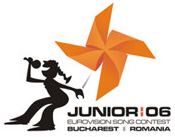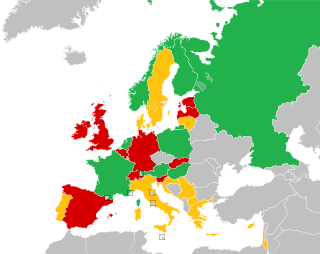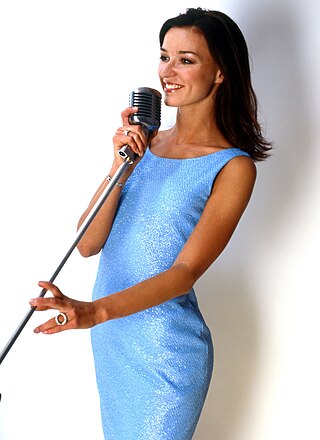Fomins & Kleins was a Latvian rock group formed in 2002.

Latvia has participated in the Eurovision Song Contest 23 times since making its debut at the contest in 2000, where the group Brainstorm finished third with the song "My Star". Latvia won the contest in 2002, with Marie N and the song "I Wanna", defeating Malta by 12 points. Latvia is the second former Soviet country to win the contest. The 2003 contest was held in the Latvian capital Riga. The country achieved its third top 10 result in 2005, when Walters and Kazha finished fifth with "The War Is Not Over".

The Junior Eurovision Song Contest 2006 was the fourth edition of the annual Junior Eurovision Song Contest for young singers aged 8 to 15. On 2 December 2006, the contest was broadcast live from Bucharest, Romania making it the second time the contest had been held in a capital city. It was organised by the Romanian national broadcaster, Romanian Television (TVR), in co-operation with the European Broadcasting Union (EBU).

The participation of Latvia in the Junior Eurovision Song Contest first began at the inaugural Junior Eurovision Song Contest in 2003 which took place in Copenhagen, Denmark. Latvijas Televīzija (LTV), a member of the European Broadcasting Union (EBU), were responsible for the selection process of their participation. Latvia used a national selection format, broadcasting shows entitled "Bērnu Eirovīzija" and later "Balss Pavēlnieks", for their participation at the contests. The first representative to participate for the nation at the 2003 contest was Dzintars Čīča with the song "Tu esi vasarā", which finished in ninth place out of sixteen participating entries, achieving a score of thirty-seven points. Latvia were originally absent from the competition from 2006 to 2009. Latvia briefly returned in 2010 and 2011 however again withdrew from competing after the contest held in Yerevan, and have yet to make their return to the contest.

Portugal has participated in the Eurovision Song Contest 54 times since its debut at the 1964 contest. Since then it has missed five contests. The contest is broadcast in Portugal by Rádio e Televisão de Portugal (RTP). Portugal won the contest for the first time in 2017 and hosted the 2018 contest in Lisbon.

The Eurovision Young Musicians, often shortened to EYM, or Young Musicians, is a biennial classical music competition for European musicians that are aged between 12 and 21. It is organised by the European Broadcasting Union (EBU) and broadcast on television throughout Europe, with some countries holding national selections to choose their representatives for the contest.

The Eurovision Young Musicians 2000 was the tenth edition of the Eurovision Young Musicians, held at Grieg Hall in Bergen, Norway on 15 June 2000. Organised by the European Broadcasting Union (EBU) and host broadcaster Norsk rikskringkasting (NRK), musicians from eight countries participated in the televised final. A total of eighteen countries took part in the competition. All participants performed a classical piece of their choice accompanied by the Bergen Philharmonic Orchestra, conducted by Simone Young. Seven countries returned to the contest, while Croatia, Cyprus and Sweden withdrew from the 2000 contest.

The Eurovision Young Musicians 1998 was the ninth edition of the Eurovision Young Musicians, held at Konzerthaus in Vienna on 4 June 1998. Organised by the European Broadcasting Union (EBU) and host broadcaster Österreichischer Rundfunk (ORF), musicians from eight countries participated in the televised final. Austria and broadcaster ORF previously hosted the contest at Musikverein in 1990. A total of thirteen countries took part in the competition therefore a semi-final was held two days earlier. All participants performed a classical piece of their choice accompanied by the Vienna Radio Symphony Orchestra, conducted by Dennis Russell Davies.

The Eurovision Young Musicians 2002 was the eleventh edition of the Eurovision Young Musicians, held at Konzerthaus in Berlin, Germany on 19 June 2002. Organised by the European Broadcasting Union (EBU) and host broadcaster Zweites Deutsches Fernsehen (ZDF), musicians from seven countries participated in the televised final. A total of twenty countries took part in the competition. All participants performed a classical piece of their choice accompanied by the Deutsches Symphonie-Orchester Berlin, conducted by Marek Janowski. Czech Republic and Romania made their début while six countries returned to the contest, they were Croatia, Cyprus, Denmark, Greece, Italy and Sweden.

The Eurovision Young Musicians 2004 was the twelfth edition of the Eurovision Young Musicians, held at the Culture and Congress Centre in Lucerne, Switzerland on 27 May 2004. Organised by the European Broadcasting Union (EBU) and host broadcaster Swiss Broadcasting Corporation, musicians from seven countries participated in the televised final. Switzerland and broadcaster SRG SSR previously hosted the contest in 1984. A total of seventeen countries took part in the competition therefore a semi-final was held in the same venue on 22 and 23 May 2004. All participants performed a classical piece of their choice accompanied by the Lucerne Symphony Orchestra, conducted by Christian Arming.

The Eurovision Young Musicians 1994 was the seventh edition of the Eurovision Young Musicians, held at the Philharmonic Concert Hall in Warsaw, Poland, afterwards the last year's contest, winning country, Bartłomiej Nizioł performing the violin instrument, dated between the 9 and 14 June 1994. Organised by the European Broadcasting Union (EBU) and host broadcaster Telewizja Polska (TVP), musicians from eight countries participated in the televised final. A total of twenty-four countries took part in the competition therefore a semi-final was held in the same venue on 9 and 10 June 1994. Out of the 24 countries, 16 did not qualify to the final, including the host country Poland. All participants performed a classical piece of their choice accompanied by the Warsaw Symphony Orchestra, conducted by Kazimierz Kord.
Latvia participated in the Eurovision Song Contest 2009 with the song "Probka" written by Kārlis Lācis, Jānis Elsbergs and Sergejs Timofejevs. The song was performed by Intars Busulis. The Latvian broadcaster Latvijas Televīzija (LTV) organised the national final Eirodziesma 2009 in order to select the Latvian entry for the 2009 contest in Moscow, Russia. Twenty songs were selected to compete in the national final, which consisted of two shows: a semi-final and a final. In the semi-final, ten entries were selected to advance based on a public vote. Ten songs ultimately qualified to compete in the final on 28 February 2009 where two rounds of voting by the public and a five-member jury panel selected "Sastrēgums" performed by Intars Busulis as the winner. The song was later translated from Latvian to Russian for the Eurovision Song Contest and was titled "Probka".

Marija Naumova-Bullīta, known professionally as Marija Naumova, is a Latvian singer of Russian descent. Under the stage name Marie N, she sings a broad range of music ranging from pop to musical theatre and jazz, and has recorded several albums, with songs in Latvian, French, English, Russian and Portuguese. In 2002, she won the Eurovision Song Contest for Latvia with her song "I Wanna".
Latvia participated in the Eurovision Song Contest 2012 with the song "Beautiful Song" written by Ivars Makstnieks and Rolans Ūdris. The song was performed by Anmary. The Latvian broadcaster Latvijas Televīzija (LTV) organised the national final Eirodziesma 2012 in order to select the Latvian entry for the 2012 contest in Baku, Azerbaijan. Twenty songs were selected to compete in the national final, which consisted of three shows: two semi-finals and a final. In the semi-finals on 7 and 14 January 2012, five entries were selected to advance from each show. Ten songs ultimately qualified to compete in the final on 7 January 2012 where two rounds of voting by a public televote and a ten-member jury panel selected "Beautiful Song" performed by Anmary as the winner.
Latvia participated in the Eurovision Song Contest 2013 with the song "Here We Go" written by Ralfs Eilands and Arturas Burke. The song was performed by the group PeR. The Latvian broadcaster Latvijas Televīzija (LTV) organised the national final Dziesma 2013 in order to select the Latvian entry for the 2013 contest in Malmö, Sweden. Twenty-four songs were selected to compete in the national final, which consisted of three shows: two semi-finals and a final. In the semi-finals on 8 and 9 February 2013, six entries were selected to advance from each show. Twelve songs ultimately qualified to compete in the final on 16 February 2013 where two rounds of voting by a public televote and a nine-member jury panel selected "Here We Go" performed by PeR as the winner.
Latvia participated in the Eurovision Song Contest 2014 with the song "Cake to Bake" written by Guntis Veilands. The song was performed by the band Aarzemnieki. The Latvian broadcaster Latvijas Televīzija (LTV) organised the national final Dziesma 2014 in order to select the Latvian entry for the 2014 contest in Copenhagen, Denmark. Twenty-four songs were selected to compete in the national final, which consisted of three shows: two semi-finals and a final. In the semi-finals on 1 and 2 February 2014, six entries were selected to advance from each show. Twelve songs ultimately qualified to compete in the final on 22 February 2014 where two rounds of voting by a public televote and a nine-member jury panel selected "Cake to Bake" performed by Aarzemnieki as the winner.

Slovenia has participated in the biennial classical music competition Eurovision Young Musicians 13 times since its debut in 1994, winning the contest for the first time in 2010.

The Eurovision Young Musicians 2016 was the eighteenth edition of the Eurovision Young Musicians contest, which took place on 3 September 2016, outside the Cologne Cathedral, in Cologne, Germany. For a second consecutive time, German public broadcaster Westdeutscher Rundfunk (WDR) was the host broadcaster for the event, with Daniel Hope and Tamina Kallert being the presenters for the show. Musicians representing eleven countries with European Broadcasting Union (EBU) membership, participated in the contest, with San Marino making their debut, while Greece, Moldova, Netherlands, and Portugal decided not to participate in this edition. The candidates were accompanied by the WDR Symphony Orchestra Cologne, conducted by Clemens Schuldt. A five-person jury decided which of the participants would be awarded with the top-three prizes. Łukasz Dyczko of Poland won the contest, with Czech Republic and Austria placing second and third respectively.

The Eurovision Young Musicians 2018 was the nineteenth edition of the Eurovision Young Musicians contest. It was hosted by the United Kingdom, for the first time since the inaugural contest in 1982. This edition was a co-production between the European Broadcasting Union (EBU), the Edinburgh International Festival and the British Broadcasting Corporation (BBC) as host broadcaster. Musicians representing eighteen countries with EBU membership participated in the contest, with Albania making their debut alongside seven returning countries, while Austria decided not to participate for the first time.
Latvia participated in the Eurovision Song Contest 2022 in Turin, Italy, with "Eat Your Salad" performed by Citi Zēni. The Latvian broadcaster Latvijas Televīzija (LTV) organised the national final Supernova2022 in order to select the Latvian entry for the contest. 17 songs were selected to compete in the national final, which consisted of two shows: a semi-final and a final. In the semi-final on 5 February 2022, ten entries were selected to advance alongside a wildcard selected by LTV. Eleven songs ultimately qualified to compete in the final on 12 February 2022 where a public televote and a seven-member jury panel selected "Eat Your Salad" performed by Citi Zēni as the winner.












